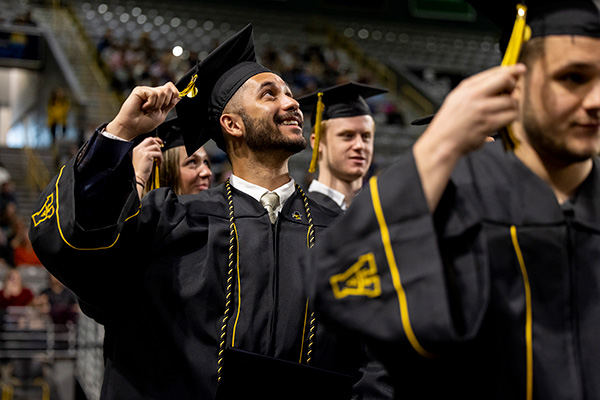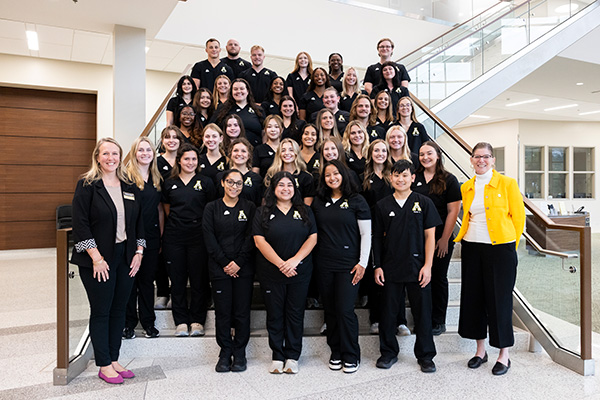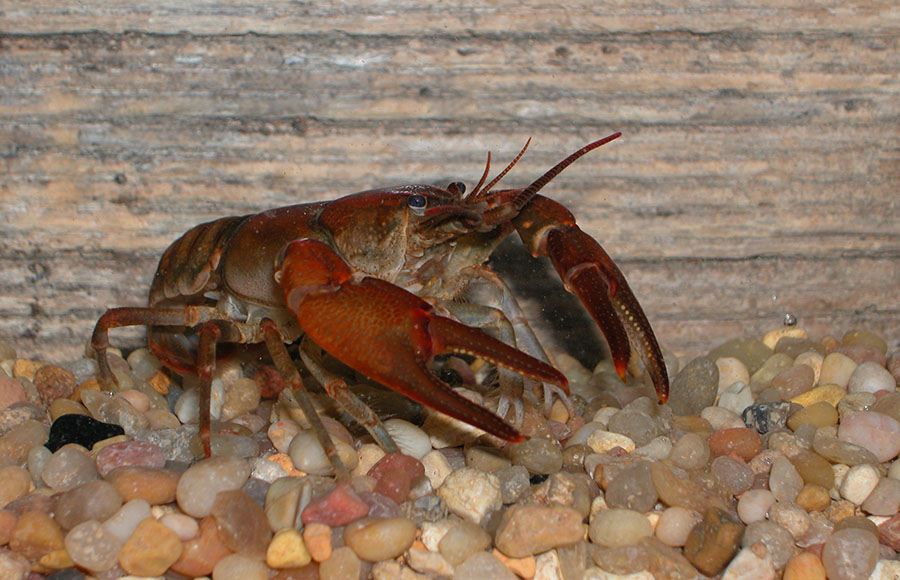
A specimen of the New River crayfish species (Cambarus chasmodactylus) featured in research experiments for the article “Strong effects of a mutualism on freshwater community structure,” published in the peer-reviewed journal Ecology in October 2020. The article was co-authored by App State professor Dr. Robert Creed; App State alumni Dr. Bryan Brown ’99, associate professor at Virginia Polytechnic Institute and State University, and Dr. Kaitlin Farrell ’12, a lecturer at the University of Georgia; and Dr. James Skelton, assistant professor at the College of William and Mary. Photo by Wayne Van Devender
BOONE, N.C. — Published research co-authored by three members of the Appalachian State University Community finds that some small, aquatic worms — no larger than half an inch — have the ability to influence entire freshwater stream ecosystems.
The research article, published in the peer-reviewed journal Ecology in October 2020 and co-authored by Dr. Robert Creed, professor in App State’s Department of Biology, is the first to document that a mutualism may affect the densities, or population numbers, of other species in freshwater ecosystems. Mutualisms are interactions between members of different species that result in positive, or beneficial effects on the survival and growth of both species involved.
According to the article, titled “Strong effects of a mutualism on freshwater community structure,” the worms are able to have these effects because they are engaged in a mutualism with crayfish, which are well known to have strong effects on freshwater systems.
“The effects and importance of mutualisms on biodiversity are well known from terrestrial and marine systems,” Creed said. “In contrast, mutualisms are not as well studied in freshwater systems and their effects on these systems had not been demonstrated. This paper shows that mutualisms can have important effects on freshwater systems as well.”
The focal mutualism, in this case, is between a crayfish host and the worms that live on the shell, or exoskeleton, of the crayfish. These crayfish worms, as they are commonly known, can increase the crayfish host’s growth and activity, Creed said.
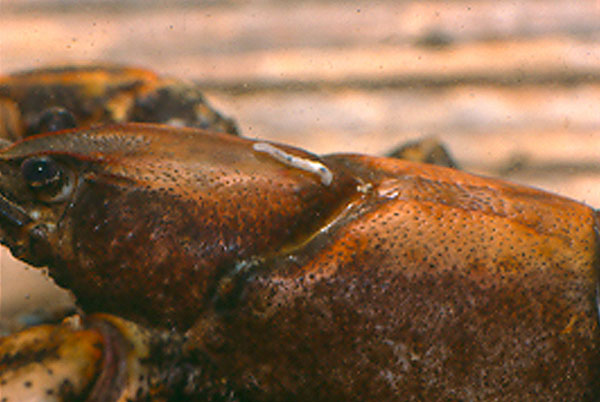
This photo shows a tiny, almost transparent worm on the carapace, or hard upper shell, of a crayfish from the New River in Western North Carolina. Published research co-authored by three members of the Appalachian State University Community is the first to document that worms such as the one pictured have the ability to influence entire freshwater stream ecosystems due to the mutualism, or relationship, they engage in with crayfish. Photo by Wayne Van Devender
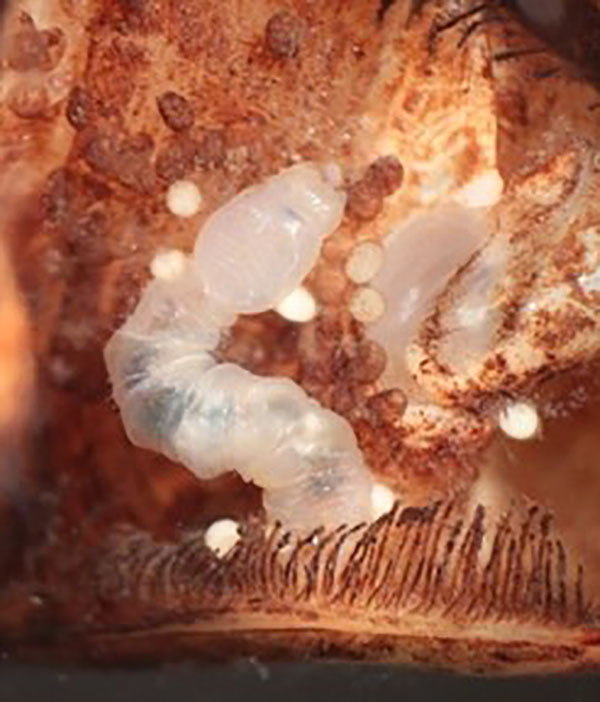
A close-up of a worm (Cambarincola ingens) surrounded by its eggs, which are referred to as cocoons. This species of worm was featured in research experiments for the article “Strong effects of a mutualism on freshwater community structure,” published in the peer-reviewed journal Ecology in October 2020. The article was co-authored by App State professor Dr. Robert Creed; App State alumni Dr. Bryan Brown ’99, associate professor at Virginia Polytechnic Institute and State University, and Dr. Kaitlin Farrell ’12, a lecturer at the University of Georgia; and Dr. James Skelton, assistant professor at the College of William and Mary. Photo by Dr. Robert Creed
“A normal number of worms — say three to six worms — on a crayfish directly improves the crayfish’s growth and indirectly, via their impacts on the crayfish, influences the abundance of other invertebrate species in the community, as well as the level of sediment that accumulates on the streambed,” Creed explained.
Crayfish can affect freshwater systems by eating various invertebrates and plants, both living and dead, as well as by bulldozing and excavating bottom sediments, according to Creed.
“A variety of crayfish worm species, formally known as branchiobdellidans, live on the exterior of crayfish species found across the world’s northern hemisphere. Thus, it is likely that similar effects of these worms may occur in lakes and streams around much of the world,” he said.
He continued, “While the crayfish can benefit with increased survival and growth, the worms get a place to live and access to the resources that they feed on that are present on the exoskeleton of the crayfish.”
The research for the article was funded by a 2009 National Science Foundation grant awarded to Creed and article co-author Dr. Bryan Brown ’99, an App State alumnus and associate professor at Virginia Polytechnic Institute and State University. App State alumna Dr. Kaitlin Farrell ’12, a lecturer at the University of Georgia, also contributed to the article as a co-author.
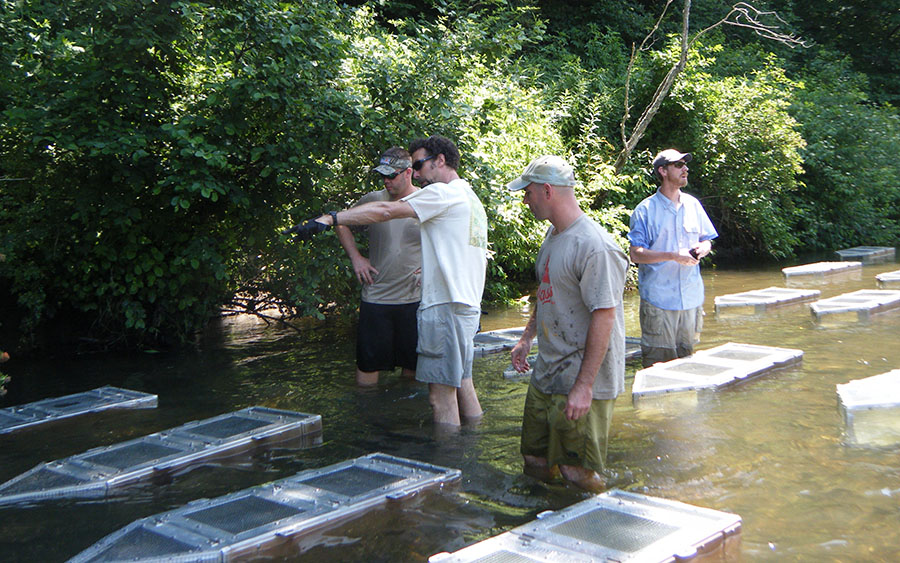
Pictured in Boone in June 2010, Dr. Robert Creed, professor in the Department of Biology at Appalachian State University, second from left, and App State alumnus Dr. Bryan Brown ’99, an associate professor at Virginia Polytechnic Institute and State University, third from left, set up a research experiment for their co-authored article “Strong effects of a mutualism on freshwater community structure,” which was published in the peer-reviewed journal Ecology in October 2020. Dr. James Skelton, co-author and assistant professor at the College of William and Mary, is pictured at far right. Photo courtesy of Dr. Bryan Brown
About Dr. Robert Creed
Creed received his B.S. in zoology from the University of North Carolina at Chapel Hill and his Ph.D. in zoology with a focus on ecology from Michigan State University. He joined App State’s Department of Biology in 1996.
Creed is a freshwater community ecologist and studies freshwater mutualisms, the ecology of crayfish and other aquatic invertebrates, as well as the importance of biodiversity for the functioning of stream ecosystems.
What do you think?
Share your feedback on this story.
About the Department of Biology
The Department of Biology is a community of teacher-scholars, with faculty representing the full breadth of biological specializations — from molecular genetics to landscape/ecosystem ecology. The department seeks to produce graduates with sound scientific knowledge, the skills to create new knowledge, and the excitement and appreciation of scientific discovery. Learn more at https://biology.appstate.edu.
About the College of Arts and Sciences
The College of Arts and Sciences (CAS) at Appalachian State University is home to 17 academic departments, two centers and one residential college. These units span the humanities and the social, mathematical and natural sciences. CAS aims to develop a distinctive identity built upon our university's strengths, traditions and locations. The college’s values lie not only in service to the university and local community, but through inspiring, training, educating and sustaining the development of its students as global citizens. More than 6,800 student majors are enrolled in the college. As the college is also largely responsible for implementing App State’s general education curriculum, it is heavily involved in the education of all students at the university, including those pursuing majors in other colleges. Learn more at https://cas.appstate.edu.
About Appalachian State University
As a premier public institution, Appalachian State University prepares students to lead purposeful lives. App State is one of 17 campuses in the University of North Carolina System, with a national reputation for innovative teaching and opening access to a high-quality, cost-effective education. The university enrolls more than 21,000 students, has a low student-to-faculty ratio and offers more than 150 undergraduate and 80 graduate majors at its Boone and Hickory campuses and through App State Online. Learn more at https://www.appstate.edu.









